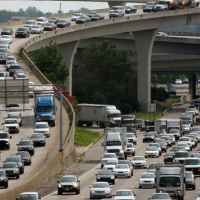Increasing Steps towards Private Control of Nation’s Highways
 (photo: Jason Getz, AP)
(photo: Jason Getz, AP)
Short on tax revenues to expand and maintain public roads, state and local governments have cut deals with private investors to pay for infrastructure projects. But the new funding models have raised concerns over whether they will mean the gradual loss of government authority over highways and roads.
In Colorado, state transportation officials cut a 50-year deal with a private investment group to finance the upkeep and operation of US 36 between Denver and Boulder. The Colorado Department of Transportation is considering other public-private partnerships (PPPs) for portions of I-70, C-470 and I-25. In 1989 Colorado became the first state to experiment with a PPP.
Now its latest venture is just the latest example in which a cash-strapped state or city has turned to investors for help with roadways. In fact, 24 states have at least one PPP road project. Indiana is relying on a billion-dollar PPP for its East End Crossing, while New York City has a $1.5 billion PPP in place to improve the Goethals Bridge.
Not everyone sees PPPs as a win-win deal. Some academics, public interest groups, and legislators warn that some PPPs have not only failed to improve transportation corridors, but gotten in the way of urban planning and threatened “the core value of roads as a public service,” according to Eric Jaffe at Atlantic Cities.
“The notion right now is that PPPs are the solution to the problem of not being able to use public funding as much, and that it becomes a win-win situation,” Elliott Sclar, director of the Center for Sustainable Urban Development at Columbia University, told Atlantic Cities. “Right now that’s the conventional wisdom, but if you actually look at what happened to so many PPPs, you begin to see where these problems are going to begin to creep up.”
Some of those problems can be found with a careful study of the fine print in the PPP contracts, claims Penn State University law professor Ellen Dannin. In her 2011 report on the subject, she disclosed that little-known “adverse action” clauses make the public the guarantor of private contractors’ expected revenues. Dannin believes that this ensures profit for the investors and compromises the integrity of the transportation network as a whole.
“We're sort of selling off part of our democracy as part of the cost,” she claims.
-Noel Brinkerhoff
To Learn More:
The Uncertain Future of Public Roads (by Eric Jaffe, Atlantic Cities)
Federal Transportation Funding May Be Running Out of Gas (by Noel Brinkerhoff and Danny Biederman, AllGov)
Will Ku Klux Klan be Allowed to Adopt a Highway in Georgia? (by Noel Brinkerhoff, AllGov)
Virginia First State to Sell Naming Rights to Roads (by Noel Brinkerhoff, AllGov)
- Top Stories
- Unusual News
- Where is the Money Going?
- Controversies
- U.S. and the World
- Appointments and Resignations
- Latest News
- Musk and Trump Fire Members of Congress
- Trump Calls for Violent Street Demonstrations Against Himself
- Trump Changes Name of Republican Party
- The 2024 Election By the Numbers
- Bashar al-Assad—The Fall of a Rabid AntiSemite






Comments